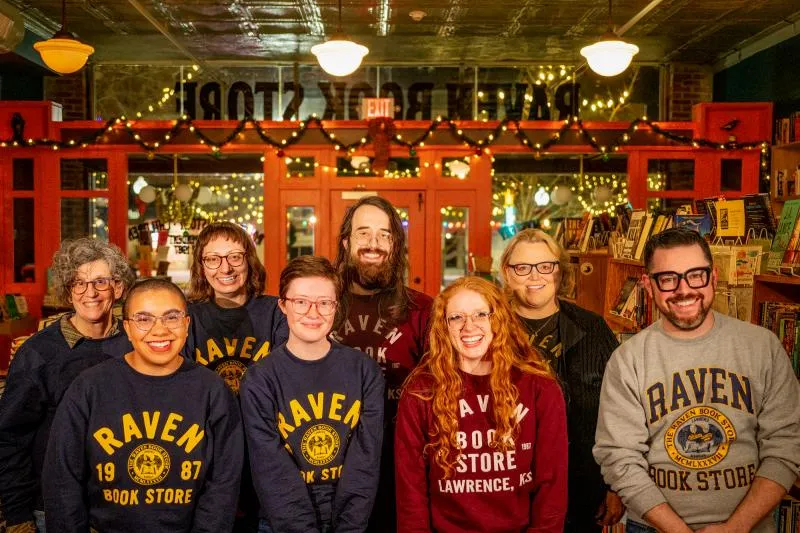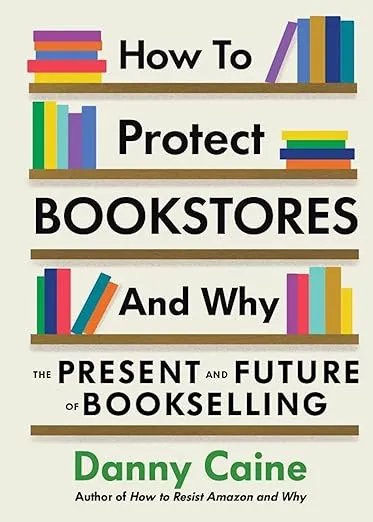Are Co-Op Bookstores the Future of Bookselling?
Bookstores are more than just places to buy books. They’re centers of their communities, places for deep and perspective-shifting conversations, and local businesses that give back to their neighborhoods. Building a flourishing bookstore business, however, is challenging. The cost of opening a bookstore — particularly in a bustling neighborhood with good foot traffic — can be astronomical. Booksellers are highly specialized workers expected to have a broad knowledge base but are typically paid low wages. Profit margins are notoriously thin, thanks in part to the fact that publishers print suggested pricing directly on the product for sale. And the rise in massive online discount sellers and digital books has made the future of bookselling look bleak.
But somehow, booksellers keep fighting back. When the coronavirus pandemic threatened all kinds of brick-and-mortar small businesses, bookstores adapted by offering curbside pickup, delivery, and outdoor pop-up options. Readers rallied around their community stores and fought to keep them open. And bookstores are now experiencing something of a boom. More than 300 new bookstores have opened since 2020, many of those stores owned by BIPOC booksellers.
Still, bookstores must look toward the future to beat the ever-looming threat of Amazon and other competitors. Bookstores are searching for ways to keep their doors open while paying booksellers a living wage and stocking books relevant to their communities. During a wave of organizing for labor rights everywhere, from the film industry in L.A. to the auto industry in Detroit, booksellers are also fighting for better pay and worker protections. Another solution more and more bookstores are exploring is co-operative ownership structures. I spoke with three co-op bookstores in Maryland, Massachusetts, and Kansas to find out how moving toward a cooperative model has shaped their businesses and how it might impact the future of bookselling.
On Protecting Bookstores
Last year, a little book with a big message took the indie bookseller world by storm: How to Resist Amazon and Why. What started as a 15-page zine expanded into an almost 200-page pocket-sized book about how Amazon threatens small businesses, steals profits from authors and publishers, and quite literally kills their own employees on the job. It’s written by Danny Caine, a poet, nonfiction writer, and bookseller at the Raven Book Store in Lawrence, Kansas.
Caine builds a compelling case in How to Resist Amazon and Why about how the behemoth company damages communities, collects concerning amounts of data, and erodes the book industry from all sides. But in his new book, How to Protect Bookstores and Why, Caine is more interested in finding solutions to the problems created by Amazon and other threats to small bookstores.
“I spent so many years of my life thinking about the wrong way to do business and how workers are getting dehumanized and mistreated, and how the dignity of work is disappearing or maybe was never even really there, in our industry and in industries that touch our industry,” Caine shared in an interview with Book Riot. “The whistleblower is an important role, but that’s not really where I see myself. I’m interested in solutions, even on a small scale.”
To find those solutions, Caine interviewed owners and booksellers at 12 bookstores across the country to find out how they’re supporting their communities and keeping their doors open. Each chapter focuses on a different bookstore, along with particular problems facing that store and ways people inside and outside the book industry can help.
“I didn’t want to come from a point where I was patting myself on the back for doing a good job at the Raven, so I didn’t write about the store,” Caine said. “What’s much more interesting for me as a writer is to write about other stores, to be an observer and learn and take inspiration from the folks I was talking to. From there, I knew I wanted a good mix of stores, different types of stores. We’ve got employee-owned co-ops, stores that are nonprofits, Black-owned stores, Indigenous stores. I don’t think there is one answer to what community bookselling looks like, and I wanted the selection of stores in the book to reflect that. I didn’t set out with a set of conclusions. I really asked myself a question and let the interview subjects push me toward the book’s conclusion.”
The book industry has a problem where talented young booksellers can’t form a career.
How to Protect Bookstores and Why is a quick and fascinating read, whether you’re a seasoned bookseller or simply someone who loves shopping at your local bookstore. But while reading the book and hearing Caine speak about his own bookselling experiences, I was particularly interested in the steps he’s taken at his store.
Caine was a part-time bookseller at the Raven when the owners put the store up for sale in 2017, and he purchased it. He’s experienced the challenge of building a bookseller-to-owner pipeline firsthand. That’s why, in January 2022, Caine sold 49% of shares in the business to seven of his experienced and passionate booksellers, turning the Raven Book Store into an employee-owned cooperative. And knowing how hard it can be to access capital as a bookseller, Caine loaned them the funds to invest.

“The book industry has a problem where talented young booksellers can’t form a career,” Caine said. “It’s not lucrative enough, or there aren’t enough good jobs where people want to stick around. Even at the Raven, can we make four or five good jobs? Can we retain a good, talented core of booksellers who are interested in bookstore ownership but don’t have the capital to do it? We started having discussions. I talked to Porter Square Books about how they did it. I did some research into co-ops and what it would take to implement this kind of thing. Based on our situation, and the folks who were interested, we arrived at this model that we borrowed from Porter Square. It works for us, and I would hope other people are looking at alternative ownership models or innovative succession plans or how to empower workers, how to let people buy into businesses without having a ton of cash on hand.”
What Are Co-Op Bookstores?
Cooperatives are businesses that exist in the space between for-profit and not-for-profit businesses. They’re democratically run by a group of investors who buy into the business and receive dividends of profits. Cooperatives can be employee-owned or open to the public, and different co-op bookstores utilize different models. But the goal of all co-op bookstores is to meet the needs of each store’s employees, customers, and communities by sharing decision-making and profits.
Red Emma’s is a radical bookstore, restaurant, and event space in Baltimore, Maryland that has operated as a worker cooperative since opening in 2004. It’s one of the 12 bookstores featured in How to Protect Bookstores and Why, and after reading about the store, I reached out to ask them about their co-op structure.
“Brick and mortar bookstores — at their best — have always been about personal connection to their readers and an organizational connection to their community,” said John Duda, a founding worker-owner of Red Emma’s. “Those kinds of connections are really what makes a bookstore more than just a retail enterprise, and is really the only thing that gives them a shot against the efficiency of online fulfillment from the megaplatforms. Being a worker cooperative means that everyone slinging books has the opportunity to be deeply invested in creating and stewarding these connections.”
Every worker-owner at Red Emma’s owns an equal share of the business, and decisions are made by group consensus. This model has worked for the store for almost two decades. Additionally, they’re spreading the word about co-op ownership to other businesses in Baltimore, like advising staff at a local coffee shop that abruptly closed to help them reopen as a co-op. They also believe the co-op model is something other bookstores around the country should consider.
“Bookselling, as a relatively small, relatively less-capital-intensive sector, with a heavy dependency on the skill and knowledge of its workers, is a really good fit for cooperative worker ownership, and especially as more sole proprietors look for an exit, it’s likely we’ll see more conversions,” said Duda. “When we started out in 2004, for the most part, there wasn’t the kind of widespread infrastructure for making and helping finance worker cooperatives that we see today, which means that while we had to blunder through a lot on our own, today there’s a lot more resources to leverage, which should make start up co-op projects and transitions to cooperative ownership a lot easier.”
Today, bookstores considering cooperative ownership certainly benefit from the perspective of other stores. “We couldn’t have done the ownership change without talking to other stores, absolutely,” said Danny Caine about the Raven’s transition. “I think that’s one of the great things about the book industry is how willing people are to talk and share secrets with you and help each other out. I’ve never had a bookseller be like, ‘No, I’m not going to tell you that, I’m not going to help you with this.’ Not only that decision but many other decisions we’ve made are made in consultation with other folks that we admire and trust in the industry.”
When Customers Invest
Both the Raven Book Store and Red Emma’s are worker-owned cooperatives. But what about bookstores that offer ownership and voting privileges to customers and members of their communities?
That’s what Rozzie Bound Co-op, a bookstore in Roslindale, Massachusetts, set out to create in August 2022. Community members can buy into Rozzie Bound for as little as $100, giving them the right to participate in annual shareholder meetings, elect board members, and get discounts on books and merch. Decisions about the store are made by a board of directors consisting of both worker-owners and consumer-owners.
“The cooperative model creates shared profitability, allowing more people to participate in the local economy,” said Talia Whyte, a worker-owner at Rozzie Bound. “We became a hybrid co-op because it is more financially sustainable for us. Also, we wanted to give community members a more substantive way to support the bookstore beyond just buying a book from us occasionally. Many people these days say they want to support independent bookstores, so we are giving them an easy way to do that.”
Many of Rozzie Bound’s consumer-owners participate in the book ambassador committee that coordinates with the local library, selects authors for events, and runs the store’s book clubs. Consumer-owners are expected to help promote the store and encourage new customers to join them. “We have strong ties with the local community and want to continue strengthening them,” Whyte said. “When a co-op does well financially, the community served by the co-op also benefits.”
Complications in Co-Ops
Co-op structures are a thoughtful way to address some of the problems in the bookselling industry by offering employees a path to store ownership and democratizing decision-making processes. But like every community is different, every community bookstore is different, and co-ops are not a one-size-fits-all solution.
John Duda was surprised by “just how much unlearning people have to do in order to be able to work together collectively in a democratic manner” at Red Emma’s. “This should be a basic life skill, but really very little of anyone’s formal education or more mainstream work experience in our society prepares them for actually being in shared control of their own workplace.”
“There may be a learning curve for someone who is going from employee to worker-owner and doesn’t have business management or ownership experience,” said Talia Whyte of Rozzie Bound. “Owning a bookstore takes a considerable amount of time, money, and resources, and you have to be willing to learn a lot quickly and be proactive in running your business. If someone is thinking about becoming a cooperative or opening a bookstore for the first time, get the relevant experience first and bring on like-minded people who can help you make your cooperative business a reality.”
These challenges and the financial realities of operating a bookstore are not easy, and we remain buoyed by the brilliant ways so many bookstores are imagining their futures. The not-for-profit model is but one avenue.
For some co-op bookstores, the difficulties of running a cooperative business in a late-stage-capitalist world are too great. Seminary Co-op Bookstores, after 58 years as a co-op, transitioned to a not-for-profit model in 2019. “Effectively, we have not been a co-op for a long time,” bookstore leadership said at the time of the change. “Although the co-op structure made sense for the time in which it was established, given changes in the market and the way the bookstores operate, the co-op model does not confer any benefit today and, in fact, creates additional burdens that do not serve our mission.”
After years of governance struggles, difficulty operating under Illinois state law, and shrinking profits, Seminary Co-op made the change with the support of their community and a commitment to maintain the store’s culture and community value. Their shift to a not-for-profit model in an industry that has become less profitable over decades “announces our intentions to provide cultural, literary, and communal value,” said Clancey D’Isa, Director of Strategy and Development at Seminary Co-op. “It has also allowed us to articulate better the daily work that goes into providing an unparalleled experience of discovery in our stores. Maintaining a space dedicated to books is the most valuable thing we do, and the variable skills and expertise that go into that stewardship are worthy of recognition and celebration.”
“Our model presents us with the continued opportunity to narrate the value of our work to stakeholders while acknowledging the critical challenges facing our trade,” said D’Isa to Book Riot about their move away from a co-op structure. “These challenges and the financial realities of operating a bookstore are not easy, and we remain buoyed by the brilliant ways so many bookstores are imagining their futures. The not-for-profit model is but one avenue. For our stores, which have always sought to be a space of book-based discovery, the not-for-profit model allows us to continue to privilege and strive for that aim: to be, above all else, a bookstore.”
The Future of Independent Bookselling
Despite its difficulties, cooperative ownership offers some answers to the problems facing bookstores, and we’ll likely see more stores experimenting with this framework in the coming years.
John Duda said that co-op businesses are “surprisingly hard to navigate at times — because all of the bad habits we have internalized to cope with deeply hierarchical and unequal institutions come crashing out as you are trying to run a business together. But it’s also surprisingly beautiful when you figure it out and actually manage to create something that works collectively.”
“One of the wonderful things about bookstores and the difficult things about bookstores is that these are places that are all deeply rooted in their communities, and all their communities are different,” said Danny Caine. “As much as the forces of capitalism want to level everything into this homogenized corporate version of the public square, communities still hang on to their uniqueness, and so do their bookstores. I don’t think there’s one solution for everything. I think the broad solution for bookstores isn’t necessarily our brand of community ownership. I’m not even sure it’s the right solution for us. It’s an experiment, we’re working through it. But I do think asking the question and dreaming big is important. Books, a bookstore, it reminds people of certain aspects of the past. I think that’s okay, but not to get stuck in that, to be open to conversations about innovations that can bring bookstores into the future, a willingness to be curious about it, I think that’s a solution.”
But to Caine, “independent” is a complicated word in bookselling regardless of whether stores function as co-op, for-profit, or not-for-profit businesses. “I think ‘independent’ is a useful term, especially when we say we’re independent of corporate bookselling or independent of Amazon,” said Caine. “But I think it runs into a risk when we become independent from each other. Not only bookstores from other bookstores, but are the bosses independent from the workers, and vice versa? I would hate for us to take the independent notion so far that we lose the notion of collectivity. Because that’s one of the easiest ways that corporations can defeat us and make us feel like we’re alone or small. When you feel lonely or small, it’s that much easier to give up. But when you feel a sense of connection or solidarity or collectivity, and you feel like your problems are shared by so many other inspiring people in your community and your industry, then you find strength from that.”
To learn more about the problems facing today’s bookstores and what you can do to support them, I highly recommend reading How to Protect Bookstores and Why from Microcosm Publishing. You can find a list of co-op bookstores to support on Rozzie Bound’s website.




